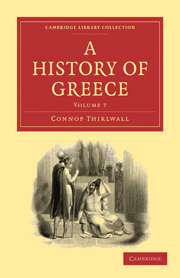Book contents
- Frontmatter
- Contents
- ERRATA
- CHAPTER LIII ALEXANDER'S CAMPAIGNS IN INDIA TO HIS RETREAT FROM THE HYPHASIS
- CHAP. LIV ALEXANDER'S PASSAGE DOWN THE INDUS AND RETURN TO SUSA
- CHAP. LV FROM ALEXANDER'S RETURN TO SUSA TO HIS DEATH
- CHAP. LVI FROM THE DEATH OF ALEXANDER TO THE END OF THE LAMIAN WAR
- CHAP. LVII FROM THE END OF THE LAMIAN WAR TO CASSANDER'S OCCUPATION OF ATHENS
- CHAP. LVIII FROM CASSANDER'S OCCUPATION OF ATHENS TO THE TREATY BETWEEN ANTIGONUS AND PTOLEMY, CASSANDER AND LYSIMACHUS, IN 311 B. C.
- CHAP. LIX FROM THE PEACE OF 311 TO THE BATTLE OF IPSUS
CHAP. LV - FROM ALEXANDER'S RETURN TO SUSA TO HIS DEATH
Published online by Cambridge University Press: 05 July 2011
- Frontmatter
- Contents
- ERRATA
- CHAPTER LIII ALEXANDER'S CAMPAIGNS IN INDIA TO HIS RETREAT FROM THE HYPHASIS
- CHAP. LIV ALEXANDER'S PASSAGE DOWN THE INDUS AND RETURN TO SUSA
- CHAP. LV FROM ALEXANDER'S RETURN TO SUSA TO HIS DEATH
- CHAP. LVI FROM THE DEATH OF ALEXANDER TO THE END OF THE LAMIAN WAR
- CHAP. LVII FROM THE END OF THE LAMIAN WAR TO CASSANDER'S OCCUPATION OF ATHENS
- CHAP. LVIII FROM CASSANDER'S OCCUPATION OF ATHENS TO THE TREATY BETWEEN ANTIGONUS AND PTOLEMY, CASSANDER AND LYSIMACHUS, IN 311 B. C.
- CHAP. LIX FROM THE PEACE OF 311 TO THE BATTLE OF IPSUS
Summary
Alexander might now be said to have returned into the heart of his dominions; since the Indus, the laxartes, and the Nile, had become Macedonian rivers. It was a question at that time of great importance to the whole civilised world, what were the plans now floating in the imagination of the youthful conqueror, if not yet reduced to a settled purpose. His character and past achievements naturally excited an expectation of enterprises still more extraordinary. None, perhaps, not absolutely impracticable, could be thought too great for his ambition, or too arduous for his adventurous spirit. Some of those attributed to him however could only have been deemed probable by persons who were incapable of duly estimating the sagacity and prudence which guided even his boldest undertakings. It was believed by many, that he designed to circumnavigate Arabia to the head of the Red Sea, and afterwards Africa, then, entering the Mediterranean by the Pillars of Hercules, to spread the terror of his arms along its western shores, and finally to explore the northern extremity of the lake Mæotis, and, if possible, discover a passage into the Caspian Sea. These reports were not altogether without a visible foundation. They seem to have arisen out of the simple fact, that Alexander, on his return from India, prepared to equip a fleet on the Euphrates, and sent orders to Phœnicia for vessels to be built there and transported to Thapsacus; thence to fall down the river to Babylon, where a harbour was to be formed, capable of containing 1000 galleys of war.
- Type
- Chapter
- Information
- A History of Greece , pp. 70 - 115Publisher: Cambridge University PressPrint publication year: 2010First published in: 1840



